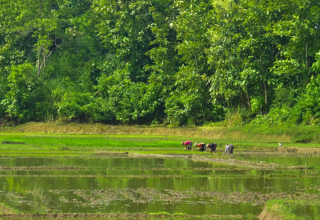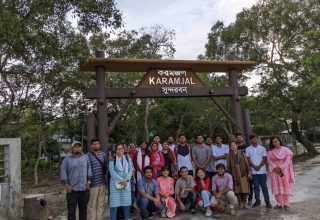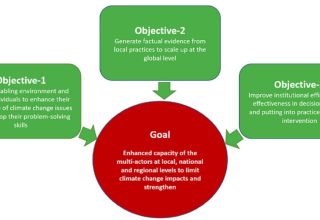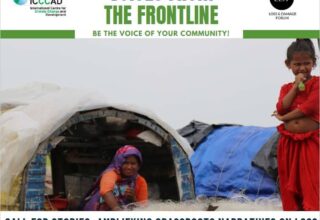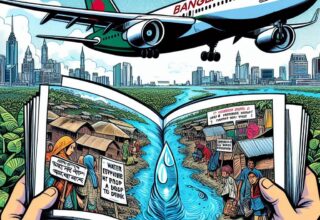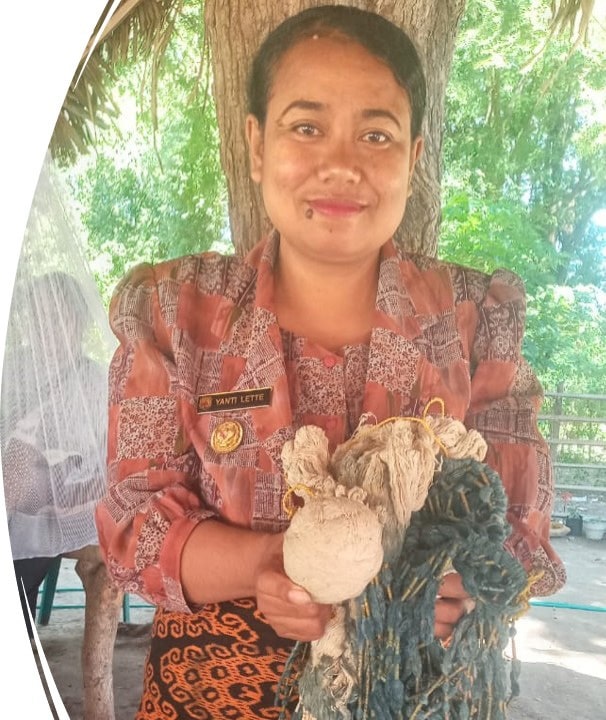
In the sun-drenched landscapes of West Timor, a remarkable tale unfolds – a tale of resilience, adaptation, and the power of unity. Here, rainfall is a scarce blessing and the sun’s intensity paints the earth in shades of arid beauty. A community stands at the crossroads of climate change and survival. Amidst the challenges of unpredictable weather and the spectre of cyclones, the local farmers and households tread a delicate path, hoping for bountiful harvests during the fleeting wet season. Yet, the threat looms large – crop failures mean not just empty stomachs, but the shadow of stunting, a silent plague that affects both women and children. Stunting is characterised by a diminished height-for-age, often stemming from persistent undernutrition, typically linked to socioeconomic hardship, maternal health and nutrition challenges, frequent illnesses, and inadequate early-life feeding and caregiving practices, as described by the World Health Organization.
Within this intricate dance of nature and human lives, hope takes root. The heart of the innovative solution has been supported by a grant from the UNDP-Adaptation Fund Climate Innovation Accelerator (AFCIA). – that beckons with the promise of a better tomorrow. UNDP-AFCIA accelerates innovative technologies, practices, and business models for local adaptation through tapping into the incredible potential of NGOs, civil society, women, and young innovators.
With this grant, the organisation has restored degraded environments, boosted incomes, improved nutrition levels, and is strengthening its financial sustainability through voluntary carbon sequestration schemes. It uses climate-smart agriculture and forest restoration through planting 400 hectares of trees and engaging 500 individuals, including 300 women farmers in seed production, expanding its impact.
“Within this intricate dance of nature and human lives, hope takes root”
Simon Field, presently serving as an advisor and volunteering with Yayasan Basipae to provide assistance to the UNDP-AFCIA grant implementation, mentioned “33% of our children are born into a shadow of stunting, a fate that casts a long veil over their potential. If our government’s ambitions of 10% or even zero stunting by 2030 become reality, a hope will be carved for every household to stands resilient against climate change, and every child will be free to flourish.”
This part of the Indonesian island of Timor is unlike the lush landscapes that dot the rest of the country; here, the earth is parched, and the rains arrive for only four months, leaving eight months of arid struggle- adding immense vulnerability to the households. In the past few years, the region has experienced alternating climatic patterns of La Niña and El Niño, with 2015 being predominantly influenced by El Niño. Moreover, the looming threat of intense drought during El Niño years has led to severe water scarcity, affecting rainforest ecosystems and historical rainfall patterns. Scientific predictions point to more frequent extreme cyclones due to changing climate. Severe water scarcity during El Niño affects ecosystems and historical rainfall. Emerging pests and diseases add to the woes. Globally, climate instability is evident, reflected in the Pacific Ocean heating and irregular weather. This vulnerability touches generations, causing child stunting from insufficient early nutrition.
Cyclones intensify the struggle as they sweep through the land during the wet season, defeating the very crops that are the lifelines of these families. The community has rallied together to defy the odds. The answer lies in the earth beneath their feet – trees. Trees provide sustenance during the dry season and are a lifeline of income.
Under this initiative, the community has allied with the innovative concept of voluntary carbon credits working through a group called Plan Vivo. Trees become a currency, storing carbon as they grow, and in turn, generating revenue for those who nurture them. The women of the community are vanguards of this transformation. They understand the vulnerabilities of motherhood, the challenges of childbirth and nurturing, and the importance of securing their children’s future. With newfound enthusiasm, they embrace the opportunity to diversify their gardens with trees – mangoes, citrus, and other hardy varieties that stand tall against the changing climate. And so, a quiet revolution is born.
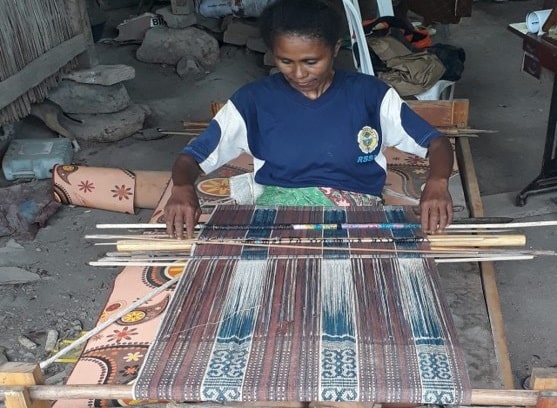
“Trees that once dotted the landscape sporadically now take root as symbols of resilience”
Trees that once dotted the landscape sporadically now take root as symbols of resilience. With each planted seedling, the community builds resilience against droughts and cyclones. Each tree represents a commitment, not just to the environment, but to the generations to come. The women who lead the transformation drive the change from within. No longer confined to tradition, these women wield the power to choose.
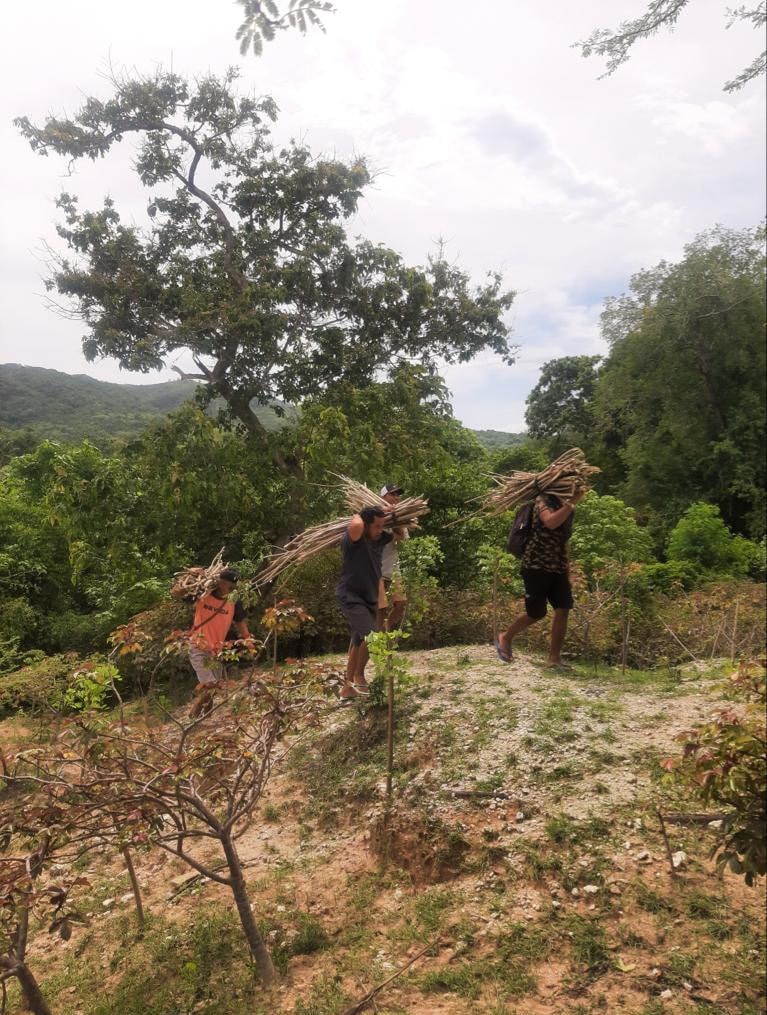
Furthermore, these women are reshaping their role in West Timor’s value chain as well. Traditionally, they relied on cotton cultivation for weaving textiles, facing price uncertainties. This project established a partnership with the socially responsible company Sukkachita, enabling women to convert their cotton harvest into yarn for sale. Additionally, they are now seeking buyers for natural dyes. With two income sources, from cotton, yarn and dyes, these women have the flexibility to choose how they use their cotton harvest, whether by direct sale, yarn production, or textile crafting. This innovative approach empowers them economically, transforming traditional practices in the community.
As the carbon credit program gains momentum, it carries the promise of a more equitable future. The vulnerable are no longer victims; they are architects of resilience. The carbon credits offer not only environmental restoration but also a lifeline of sustained income for years to come. As these communities join hands with local NGOs and other organisations in innovative partnerships, they’re not just adapting to climate change – they’re rewriting the narrative of empowerment. And as these winds sweep across West Timor, they carry with them the seeds of hope, the roots of resilience, and the promise of a more sustainable, empowered, and equal tomorrow.
“In our community, young people play a pivotal role, particularly the young women who embody determination and hope. Driven by the awareness of their vulnerability during childbirth and life’s challenges in remote settings, they eagerly participate in the program to craft a safer and more prosperous future. Meanwhile, young men, upon turning 18, venture beyond the village for income, leaving women behind to navigate household and community intricacies. The convergence of young women and men forms our community’s beating heart. Women fortify lives and future generations, while men secure sustenance afar, uniting progress. Their shared dream of choice, independence, and empowerment lights the path to a brighter future for all”, Simon said.
Yet the core challenge lies in bridging the gap between communicating the abstract concept of climate change and the tangible benefits of restoring forests to the communities. The project neatly navigated this by connecting the dots between tree cultivation and improved household economy. The most profound lesson the community learned is the power of context-driven engagement. By crafting messages that resonate with the community’s own experiences and concerns, they’ve fostered understanding and participation and harnessed the power of local wisdom.
By giving women the autonomy to select trees that resonated with their needs and aspirations, the initiative transformed from a theoretical endeavour into a practical lifeline. As trees flourish and absorb carbon from the atmosphere, they become storehouses of environmental benefits. This transformation doesn’t just end with cleaner air; it’s translated into tangible financial gains for the communities through the carbon market. By harnessing carbon credits, these women are not only planting trees but planting the seeds of a sustainable income stream that stretches over two decades. The initiative also initiated a partnership with CO2 Operate, a social enterprise based in the Netherlands involved in the carbon credit market, exemplifying the potential of such collaborations, bridging local context with international expertise to create a lasting impact and leveraging carbon credits for the communities.
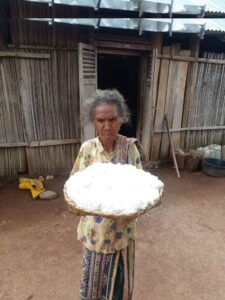
Simon emphasised, “CO2 Operate plays a pivotal role in supporting our communities through the carbon credit process. Out of the income generated from carbon credits, 20% contributes to CO2 Operate, 10% supports Yayasan Besi Pae, and the remaining 60-70% directly benefits our households. The 10% allocated to Yayasan Besi Pae is instrumental in expanding our initiatives. Our long-term 25-30-year agreement with them ensures stability and consistent revenue streams, which in turn, positively impacts local NGOs like ours. Furthermore, we foster collaborative relationships with prominent organisations such as UNDP, and international NGOs, ensuring sustained impact and stability for local NGOs like ours.”
Through these combined efforts, a narrative of transformation took shape. Women who were once tethered by the constraints of climate uncertainties found new agency and power. They diversified their income sources, sculpted their destiny, and secured a path for their children to flourish against stunting. Moreover, as the trees grew and bore fruit, so did the community, resilient and united against the challenges of a changing world. As the sun sets over West Timor, this story of hope and empowerment continues to unfold. The lessons learned here reverberate far beyond, reminding us all that with dedication, innovation, and collaboration, we can cultivate a future where climate resilience thrives and equality reigns.
About this story:
This story has been co-created with the support from ICCCAD, UNDP and YayaSan Basipae, in the framework of the UNDP managed – Adaptation Fund Climate Innovation Accelerator (AFCIA). The UNDP AFCIA programme counts with the financial contributions from the Adaptation Fund and the European Union, and has awarded 44 micro and small grants to locally-led organisations across 33 countries worldwide, accelerating their innovative solutions to build resilience in the most vulnerable communities.
UNDP-AFCIA, is one of the funding windows anchored under the Adaptation Innovation Marketplace (AIM), a multi-stakeholder strategic platform that promotes scaled-up adaptation at the local level, launched by UNDP Administrator Achim Steiner at the Climate Adaptation Summit in January 2021.
Authors: Farah Anzum is an independent consultant.

